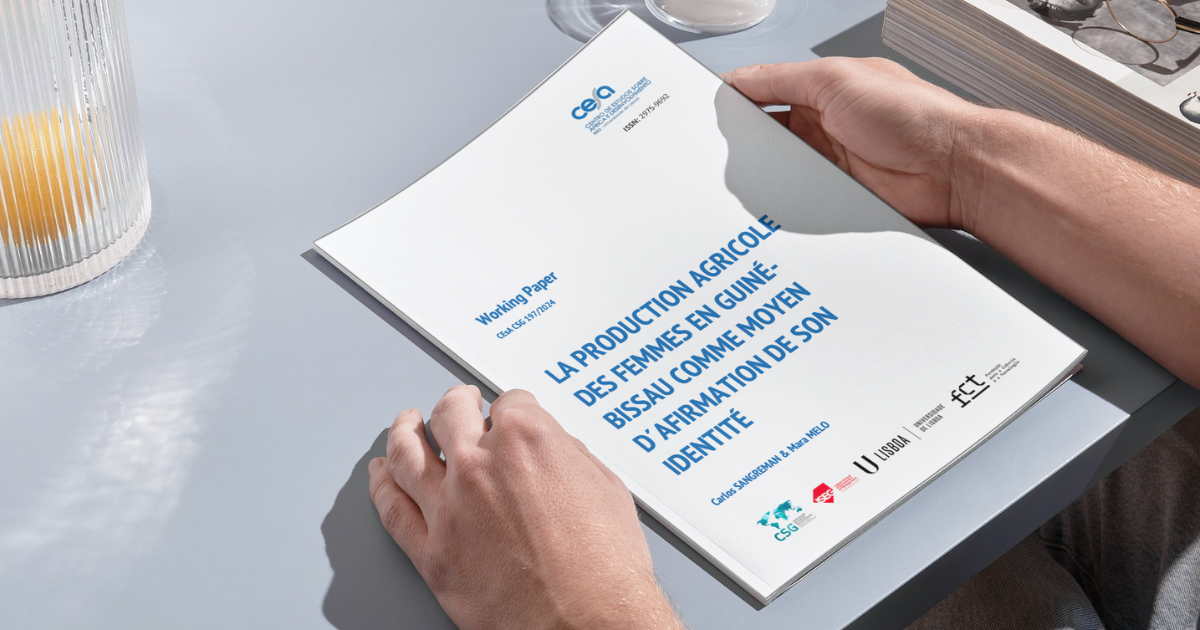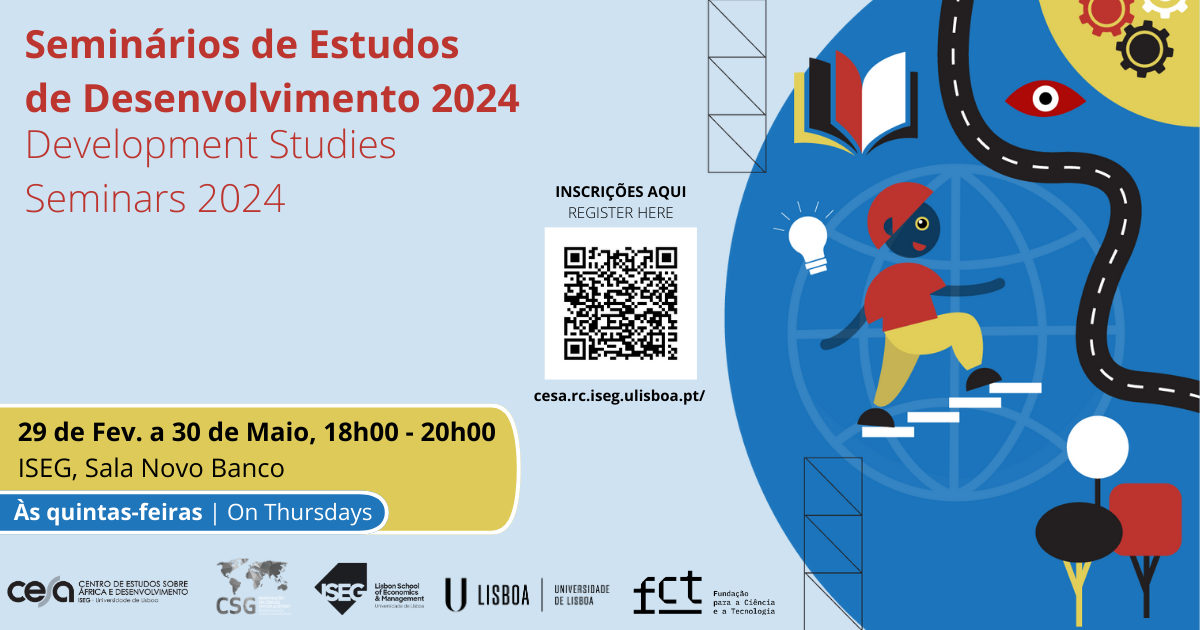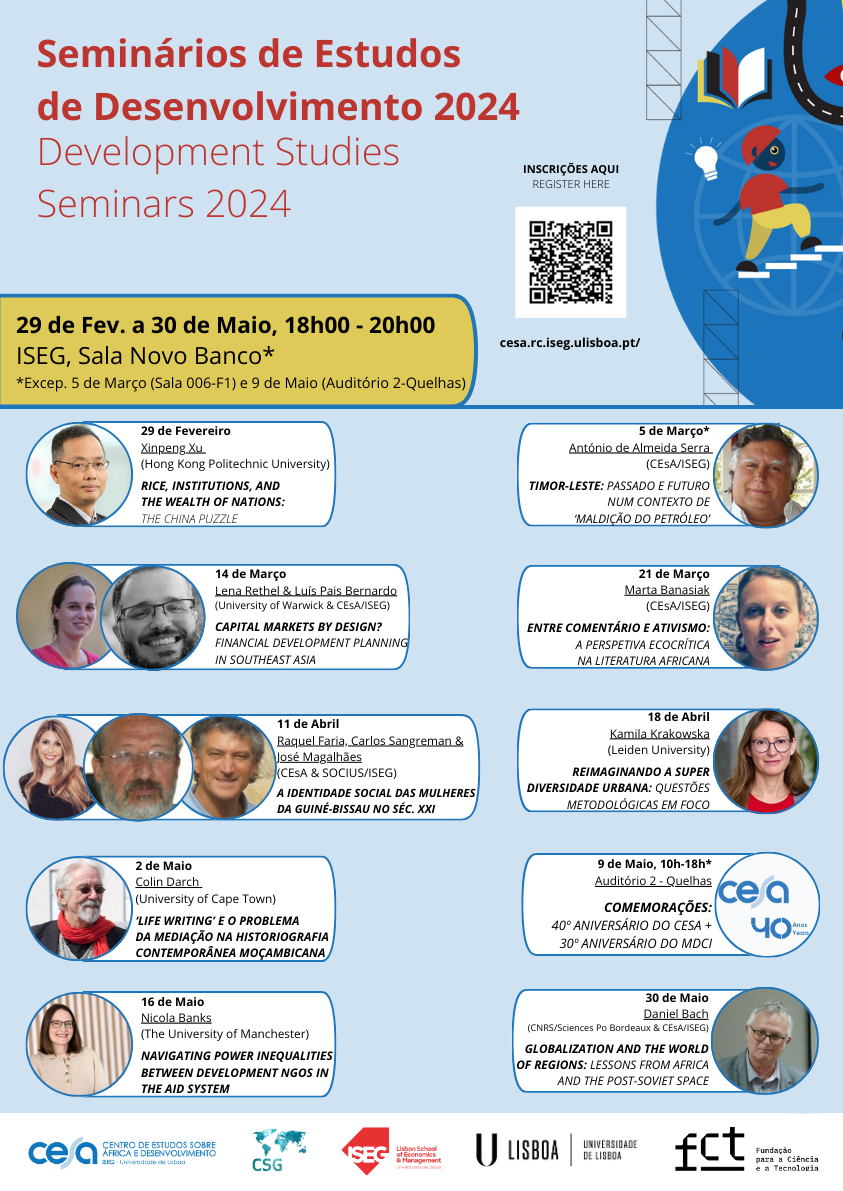CESA
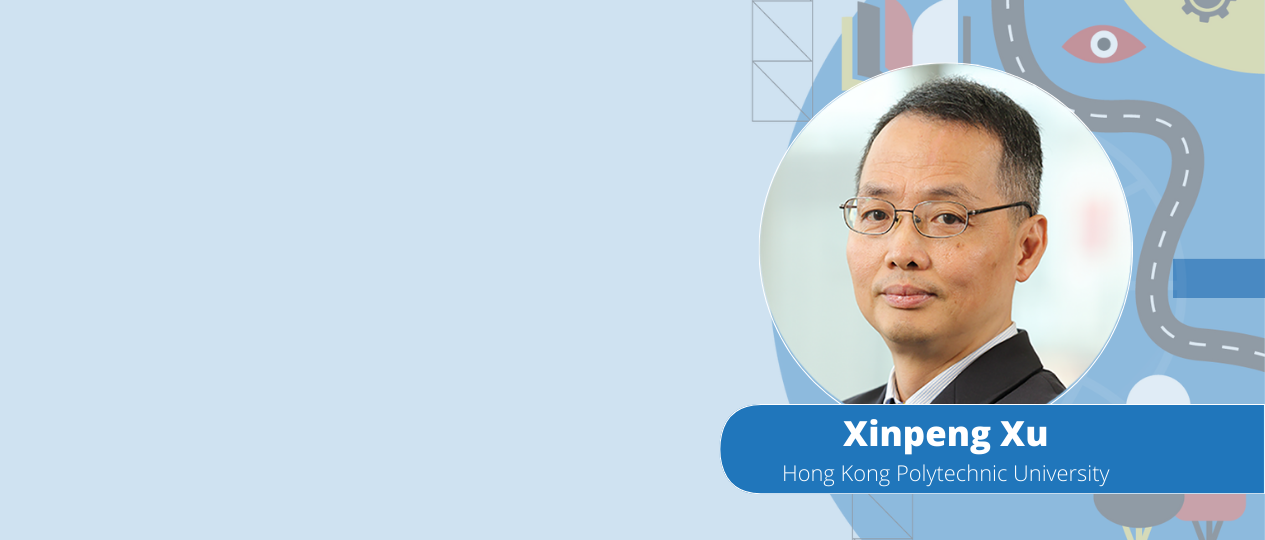
Development Studies Seminars 2024 | Rice, Institutions, and the Wealth of Nations: The China Puzzle

Development Studies Seminars 2024
Theme: “Rice, Institutions, and the Wealth of Nations: The China Puzzle”
Presenter: Xinpeng Xu (Hong Kong Polytechnic University)
Date: February 29, 2024 (Thursday)
Hour: 6 pm – 8 pm (Lisbon time)
Venue: Novo Banco Room, ISEG (Ed. Quelhas, Rua do Quelhas 6, 1200-781, Lisboa, Portugal)
REGISTER HERE!
Free admission, in person event. We recommend prior registration on EventBrite, but the capacity of the amphitheater will be filled in order of arrival.
The seminars are an initiative that, since 1991, promotes research carried out in the areas of study of MDCI/ISEG/ULisboa and PDED/ISEG/ULisboa.
More information and the complete programme: https://cesa.rc.iseg.ulisboa.pt/news/development-studies-seminars-will-kick-off-on-february-29-at-iseg-with-a-series-of-10-sessions-of-presentations-by-guest-researchers/
Why are some countries so rich while others so poor? I argue that thousands of years of farming practice has independent and long-lasting effect on the wealth of nations today. For the whole world sample, I show that rice farming is negatively associated with economic development, independent of the effects of geography and institution. However, the case of China presents a puzzle. Empirical results using disaggregated county-level data suggest a different pattern. I discuss the potential channels of the long-lasting effect, the China puzzle and implications for China’s long-term growth.
Dr. Xinpeng Xu, Professor of Economics, Faculty of Business (The Hong Kong Polytechnic University, Hong Kong)
Professor Xinpeng XU is Professor of Economics at Faculty of Business, the Hong Kong Polytechnic University, Hong Kong. Professor Xu was Visiting Professor to many leading universities in the world and was invited to give Public Lecture at Peking University in China, Charles University (Czech) and the Jagiellonian University (Poland), among others. He is the recipient of Hong Kong Research Grant Council’s competitive research grants. He received Faculty Prize for Outstanding Performance in Teaching at the Hong Kong Polytechnic University and has many years’ experience in teaching at the level of MBA, EMBA, DBA and Doctor of Management in both Mainland China and Hong Kong. Prof. Xu has published many papers in reputable international refereed journals. Professor Xu served as a consultant to international organizations such as OECD and APEC. He obtained his Ph.D. in Economics from the Australian National University, Australia.
Author: CEsA Communication (comunicacao@cesa.iseg.ulisboa.pt)
Images: CEsA/Reproduction
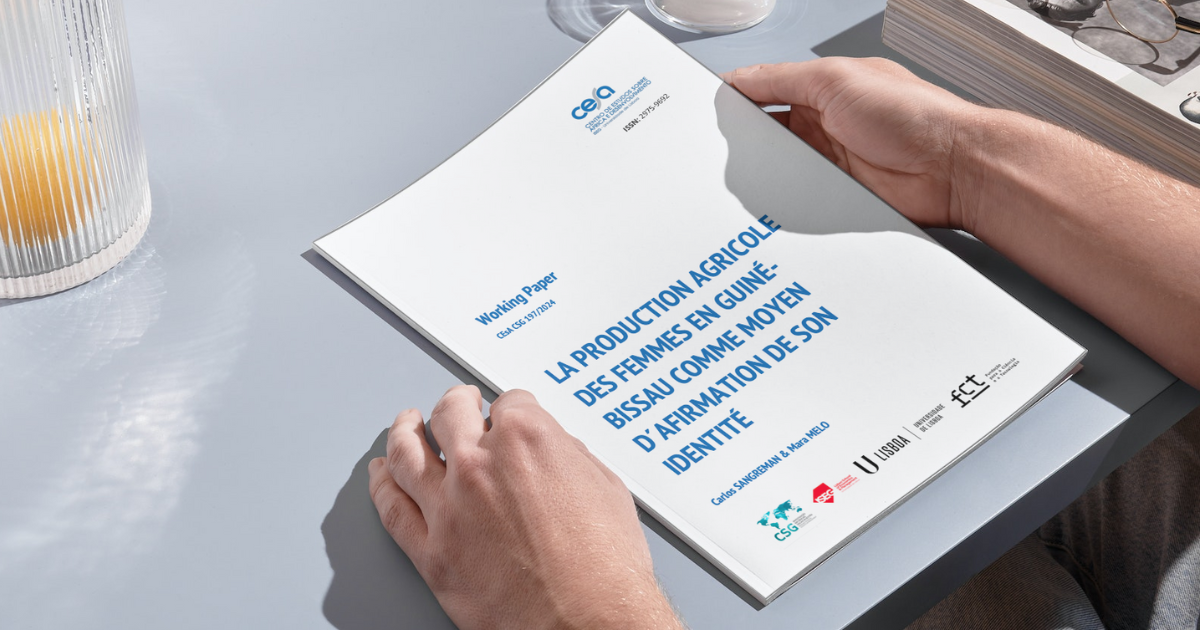
Working Paper CEsA no. 197/2024 analyses the impact of work and income on the identity of women horticulturists in Guinea-Bissau
CEsA has published its firts Working Paper in 2024 (no 197/2024), entitled “La Production Agricole des Femmes en Guiné-Bissau comme Moyen d´Afirmation de son Identité”, in French, authored by Carlos Sangreman and Mara Melo. Sangreman is President of the CEsA Assembly, is a CESA researcher, assistant professor of the Universidade de Aveiro (Portugal), and consultant for Guinea-Bissau at the Institute of Hygiene and Tropical Medicine in Portugal and Casa dos Direitos in Bissau. Melo holds a master’s degree from the University of Coimbra and the Institut d’ Études Polítques de Bordeaux.
This Working Paper is an intermediate product of the study carried out for Swiss Cooperation in Guinea-Bissau. Surveys and interviews were carried out in the regions of Bissau, Biombo, Bafatá and Oio, in the areas of production of leguminous agricultural products, by producers (mostly women). The focus of the analysis is on the practice of horticulture with the income belonging to women: “it influences the economic factor through the production and sales activity, it influences cultural factors because it is the woman who makes the key decisions for the activity and not the man and fights against family discrimination because women take on responsibilities in the family and home that they otherwise would not be able to assume and, therefore, tend to have a greater voice in family decisions”.
Click here to access the Working Paper no 197/2024.
Abstract:
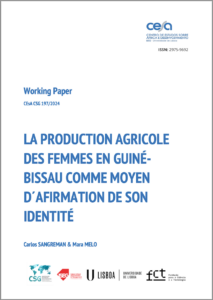 This working paper is an intermediate product of the study done for Swiss Cooperation in Guinea-Bissau, written in French without any point in Portuguese. What we demonstrate, as well as the principles of restitution and appropriation by the persons or institutions that access to respond to surveys or interviews, are words that do not translate into concrete actions for this Cooperation. The data were obtained by surveys and interviews in the regions of Bissau, Biombo, Bafatá, and Oio, with the producers (which also include a limited number of male producers) of leguminous agricultural products, in a sample of 160 people chosen at random. At the option of the promoter, the study focused on the marketing of products and not on production. To better understand the results, it must be said that this business model is not very profitable, but it is an activity that gives a greater independence of women in relation to men in the family space, since decisions about the use of profits belong to the producers. It also has a potential environment of action for the affirmation of the social (and not just family) identity of women that should not be despised although, as far as we can see, this is expressed for now only in the organization of associations of producers.
This working paper is an intermediate product of the study done for Swiss Cooperation in Guinea-Bissau, written in French without any point in Portuguese. What we demonstrate, as well as the principles of restitution and appropriation by the persons or institutions that access to respond to surveys or interviews, are words that do not translate into concrete actions for this Cooperation. The data were obtained by surveys and interviews in the regions of Bissau, Biombo, Bafatá, and Oio, with the producers (which also include a limited number of male producers) of leguminous agricultural products, in a sample of 160 people chosen at random. At the option of the promoter, the study focused on the marketing of products and not on production. To better understand the results, it must be said that this business model is not very profitable, but it is an activity that gives a greater independence of women in relation to men in the family space, since decisions about the use of profits belong to the producers. It also has a potential environment of action for the affirmation of the social (and not just family) identity of women that should not be despised although, as far as we can see, this is expressed for now only in the organization of associations of producers.
Click here and get to know all the Working Paper Collection of CEsA
Author: CEsA Communications (comunicacao@cesa.iseg.ulisboa.pt)
Images: CEsA/Reproduction
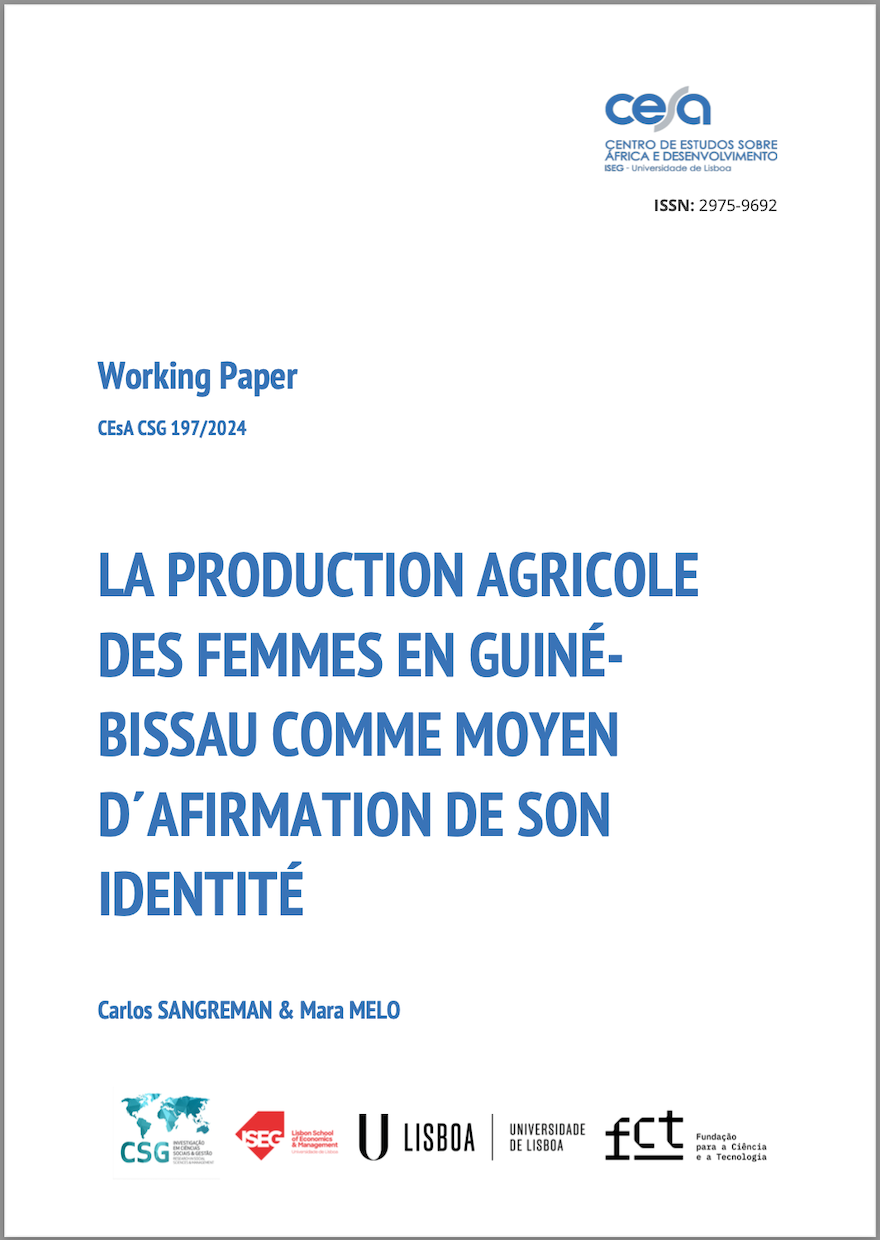
Working Paper 197/2024: La Production Agricole des Femmes en Guiné-Bissau comme Moyen d´Afirmation de son Identité
Abstract:
This working paper is an intermediate product of the study done for Swiss Cooperation in Guinea-Bissau, written in French without any point in Portuguese. What we demonstrate, as well as the principles of restitution and appropriation by the persons or institutions that access to respond to surveys or interviews, are words that do not translate into concrete actions for this Cooperation. The data were obtained by surveys and interviews in the regions of Bissau, Biombo, Bafatá, and Oio, with the producers (which also include a limited number of male producers) of leguminous agricultural products, in a sample of 160 people chosen at random. At the option of the promoter, the study focused on the marketing of products and not on production. To better understand the results, it must be said that this business model is not very profitable, but it is an activity that gives a greater independence of women in relation to men in the family space, since decisions about the use of profits belong to the producers. It also has a potential environment of action for the affirmation of the social (and not just family) identity of women that should not be despised although, as far as we can see, this is expressed for now only in the organization of associations of producers.
Cite this Working Paper:
Sangreman, C. e Melo, M. (2024). “La Production Agricole Des Femmes En Guiné-Bissau Comme Moyen D´Afirmation De Son Identité”. Instituto Superior de Economia e Gestão – CEsA/CGS – Documentos de trabalho nº 197/2024

Development Studies Seminars will kick off on February 29 at ISEG with a series of 10 sessions of presentations by guest researchers
The Centre for African and Development Studies (CEsA/CSG/ISEG/ULisboa) and the coordination of the Masters in Development and International Cooperation (MDCI) and the PhD in Development Studies (PDED) Programmes at ISEG – Lisbon School of Economics and Management, Universidade de Lisboa (ULisboa), invite you to the Development Studies Seminars 2024 — a series of 10 sessions of presentations given by guest researchers that encourage reflection on various topics in the field of Development Studies.
Seminars will take place from February 29 to May 30, 2024, on Thursdays*, from 6 pm to 8 pm, in Novo Banco Room**, at ISEG (Rua do Quelhas 6, Anfiteatro 23, Francesinhas 1, 1200-781, Lisbon, Portugal).
*The session on March 5, 2024 will exceptionally be on a Tuesday.
**The session on March 5, 2024 will take place in Room 006-F1 at ISEG. The session on May 9, 2024 will take place in Auditorium 2 at Quelhas, at ISEG.
Sessions will be presented in Portuguese or English (check the programme below), in a face-to-face format and with free admission. We recommend prior registration, but the capacity of the room will be filled in order of arrival.
The seminars are an initiative that, since 1991, promotes research carried out in the areas of study of MDCI/ISEG/ULisboa and PDED/ISEG/ULisboa.
Development Studies Seminars 2024
From February 29 to May 30 2024, on Thursdays*, from 6 pm to 8 pm.
Face-to-face event in Novo Banco Room**, ISEG (Rua do Quelhas 6, Anfiteatro 23, Francesinhas 1, 1200-781, Lisboa, Portugal)
*The session on March 5, 2024 will exceptionally be on a Tuesday.
**The session on March 5, 2024 will take place in Room 006-F1 at ISEG. The session on May 9, 2024 will take place in Auditorium 2 at Quelhas, at ISEG.
Click to download the programme:
Author: CEsA Communication (comunicacao@cesa.iseg.ulisboa.pt)
Images: CEsA/Reproduction
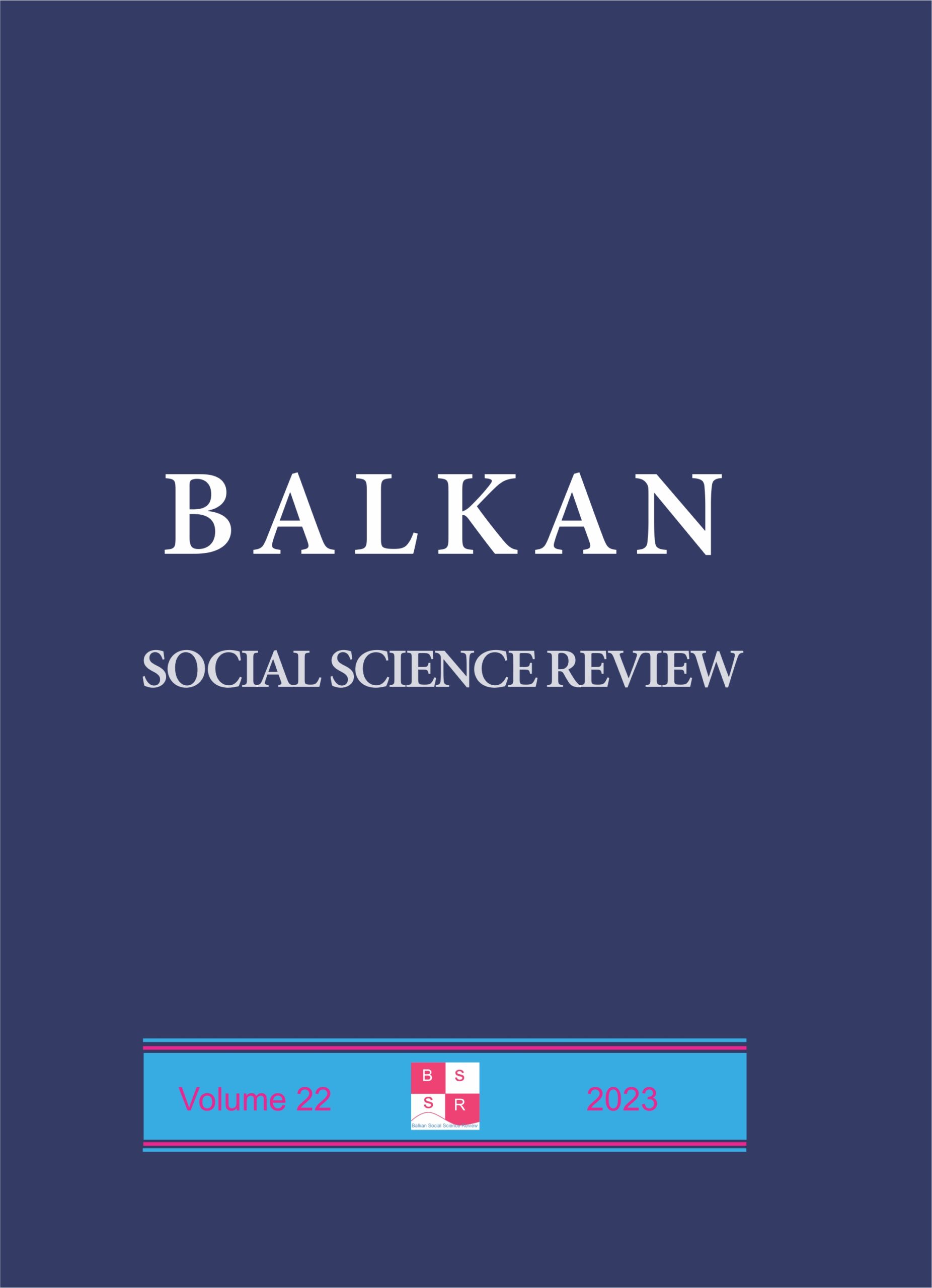
Understanding Social Realities of Internally Displaced Persons (IDPs) in the Federal Capital Territory of Nigeria (FCT), Abuja
Abstract:
This article examines the social realities of forcibly displaced persons in Nigeria, with a focus on internally displaced persons (IDPs) in the Federal Capital Territory (FCT) of Nigeria, Abuja. Internally displaced persons are individuals who have been forced from their homes or habitual places of residence and, unlike refugees, have not crossed the borders of their country. They remain under the primary protection of their governments and often seek refuge in their own countries. This study draws on secondary data sources and primary data collected from two IDPs campsites, arguing that most IDPs in the FCT, displaced by the Boko Haram insurgency live in makeshift and inhumane informal settlements in the peri-urban areas of Abuja City. These settlements also host the urban poor and other economic migrants in the country’s capital, occasionally leading to conflicts between them. The paper calls for the government to recognise the presence and condition of IDPs in the FCT and to work with relevant organisations to provide durable solutions to ensure that displaced persons can once again become productive members of society.
Cite this article:
BA-ANA-ITENEBE, C. A.; EDO, Z. O. (2023). Understanding Social Realities of Internally Displaced Persons (IDPs) in the Federal Capital Territory of Nigeria (FCT), Abuja. In: Balkan Social Science Review, Vol. 22, 213-231. https://doi.org/10.46763/BSSR232222213bai
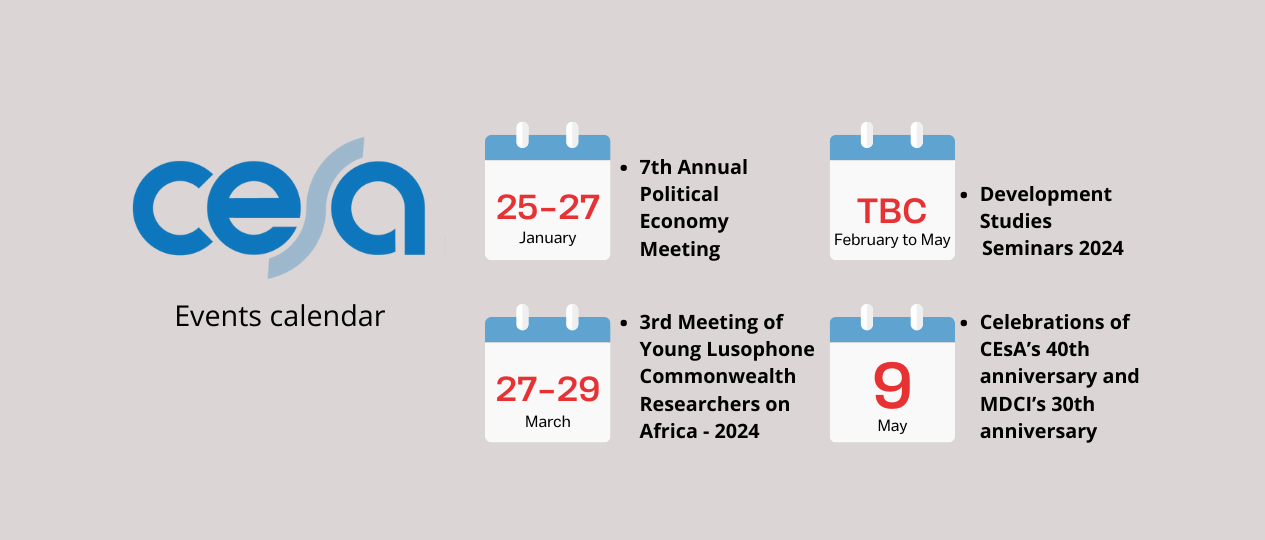
CEsA events calendar for 2024
Take a look at CEsA – Centre for African and Development Studies (CSG/ISEG/ULisboa) events calendar for 2024.

PROGRAMME AVAILABLE | 7th Annual Political Economy Meeting | January 25-27, at ISEG

The 7th Annual Political Economy Meeting, to be held at ISEG – Lisbon School of Economics and Management, on January 25 to 27, 2024, released its general and detailed Program, available for download and consultation on the event website.
The 7th Annual Political Economy Meeting, under the theme “Political Economy and Democracy: Reimagining the world in the 50th anniversary of the 25th of April Revolution”, is an initiative of the Portuguese Association for Political Economy (EcPol) in partnership with ISEG, CSG – Research in Social Sciences and Management , CEsA – Centre for African and Development Studies, Socius – Research Centre in Economic and Organisational Sociology, Advance – Research Center in Management, and DINÂMIA’CET-Iscte – Centre for the Study of Socioeconomic Change and the Territory.
Further information on the event website.
Author: CEsA Communication (comunicacao@cesa.iseg.ulisboa.pt)
Image: EcPol/Reproduction

Applications open for the PhD in Development Studies: 2nd Call starts on February 19
CEsA – Centre for African and Development Studies (CSG/ISEG/ULisboa) and ISEG – Lisbon School of Economics and Management (ULisboa) announce the Call for applications for the PhD in Development Studies 2024/25. The 1st phase began on November 13, 2023 and will end on January 19, 2024. The 2nd Phase will run from February 19 to April 12.
This PhD programme was created in 2009 and accredited by the national agency A3ES in 2015. After 2017/18, this program became a joint PhD of ISEG (School of Economics and Management), ICS (Institute of Social Sciences), IGOT (Institute of Geographic and Spatial Planning) and ISA (School of Agriculture) of Universidade de Lisboa, with some changes in its content, recently approved by the national agency A3ES. This PhD is for anyone interested in obtaining advanced academic training and doing research with a view to working in jobs related to international and national development in the public sector, the private sector, or the non-profit sector.
Further information on IGOT website.
CEsA plays an important role in teaching at ISEG, through representing CEsA as a member of the Scientific and Pedagogical Committee of the PhD in Development Studies (PDED); by supporting and teaching several of the course units; and by supervising student’s’ theses. CEsA also regularly organises international seminars and conferences that enable PDED students to be in permanent contact with leading-edge research in their respective areas. Further information about CEsA HERE.
Author: CEsA Communication (comunicacao@cesa.iseg.ulisboa.pt)
Image: CEsA/Reproduction
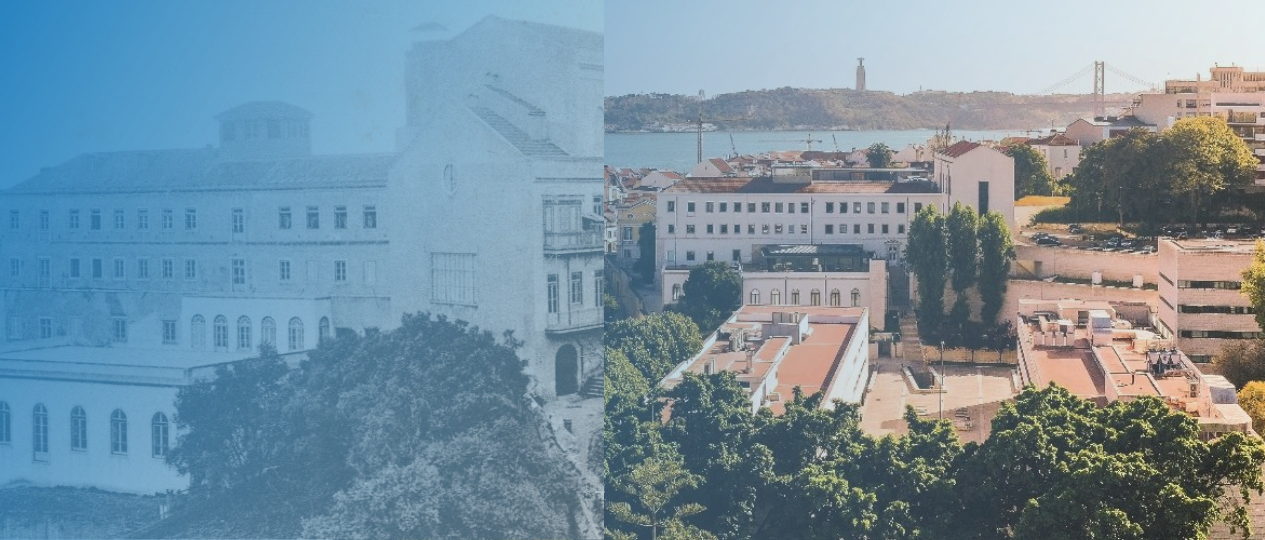
Celebrations of CEsA’s 40th anniversary and MDCI’s 30th anniversary
The Center for African and Development Studies (CEsA/CSG/ISEG/ULisboa), one of the oldest research centers in Portugal dedicated to Development Studies, is pleased to invite all researchers, students, professionals and enthusiasts of Development Studies to celebrate its 40th anniversary, together with the celebration of the 30th anniversary of the Masters in Development and International Cooperation of ISEG.
CEsA is getting the party ready, so please Save this Date: May 9, 2024. It is important to celebrate both our journey and the important work done in African Studies and Development, as well as the new plans and the will to continue journeying towards an open future.
CEsA 40th anniversary and MDCI 30th anniversary
May 9, 2024
10:30 am – 6 pm
Auditório 2/Quelhas, ISEG (Ed. Quelhas, Rua do Quelhas nº 6, 1200-781, Lisbon, Portugal)
Registration: https://aniversario-40-anos-CESA-30-anos-MDCI.eventbrite.pt
Read more:
Find out more about CEsA: a reference in Development Studies since 1983
CESA Constitution Statute (in Portuguese)
History of the founding of CEsA by Professor João Estêvão (in Portuguese)
Discover the Master in Development and International Cooperation (MDCI)
Author: CEsA Communications (comunicacao@cesa.iseg.ulisboa.pt)
Images: CEsA/Reproduction
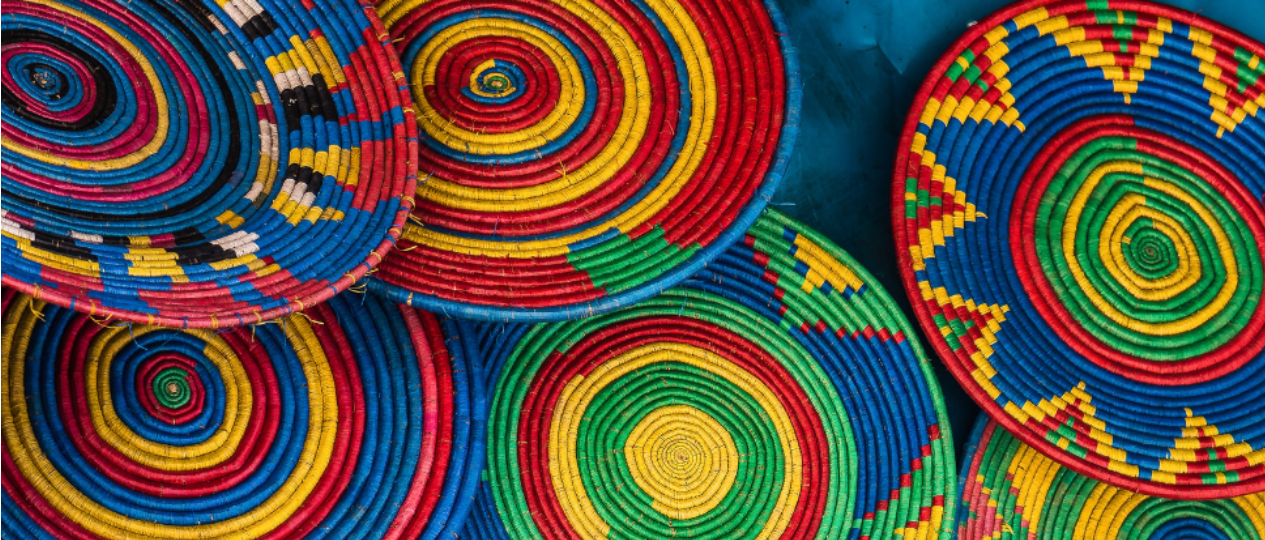
DEADLINE EXTENDED: The 3rd Meeting of Young Lusophone Commonwealth Researchers on Africa 2024 will receive proposals until January 15
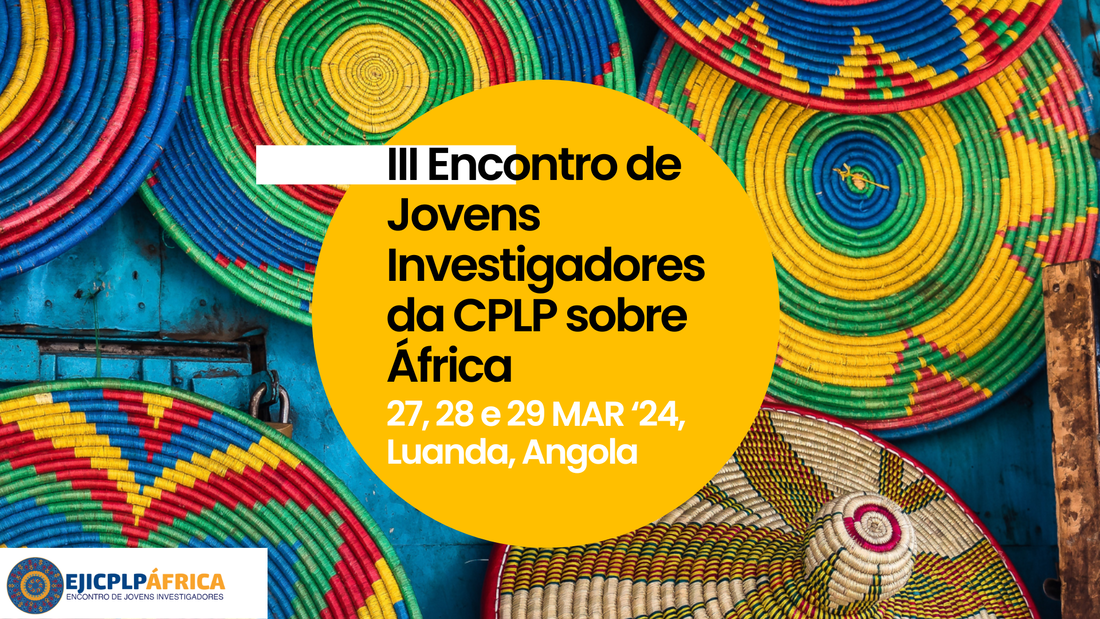
The 3rd Meeting of Young Lusophone Commonwealth Researchers on Africa 2024, which will take place between the 27th, 28th and 29th of March 2024 in Luanda, Angola, has extended the deadline for submitting papers until January 15, 2024. Only ongoing research work or work carried out in the last 5 years must be submitted by researchers aged between 18 and 40. Only 30 Communications will be selected for presentation in hybrid format.
More information on the event website: https://www.encontrojovensinvestigadorescplp.org/chamada-de-trabalhos.html
Author: CEsA Communications (comunicacao@cesa.iseg.ulisboa.pt)
Images: Reproduction
